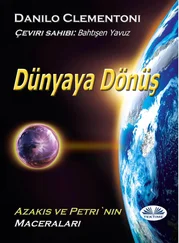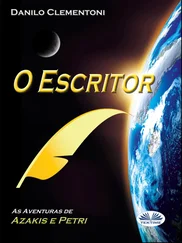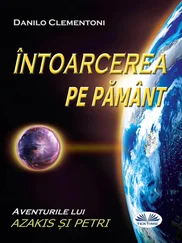That evening Žana returned to the barracks a little late. It was a wet November night, ice cold, and the grim wind carried the worn and ill-tuned sounds of the prisoners’ orchestra playing Beethoven’s Eroica as well as the camp tune “The Girl I Adore.” Polja was still babbling unintelligibly. In Russian. Dying. No one dared light a lamp and Žana made her way, groping, over to her bunk (she oriented herself by Polja’s death rattle). Marija feared that Polja, however, was beyond hearing. Then she freed her child from the straw and rags in which it was sleeping: a little wax doll. Marija didn’t dare get too close to Polja. She feared for her child. And for herself. His mother.
The sound of Žana’s steps reached her ears: this liberated her from thoughts of Polja. And then all at once it dawned on her with great conviction that something must have happened. Whatever it was that had held Žana up this long. A message from Jakob. Or from Maks. (“That Maks” was undoubtedly up to something. Present but invisible.) But Žana said nothing. Marija only heard her light, conspiratorial footsteps. (Suddenly this seemed extremely odd to her: Žana had still not taken off her boots.) Then the rustling of straw, the dull thud of her heavy boots shed, the rusty sound of the tin can of water, and once more the rustling of straw, this time over by Polja, and then: the slight clinking of Polja’s teeth against the can. Marija wanted, in vain, to give some sort of signal, to say something about Polja, not only to express her doubt that she could accompany them on their journey but also to say at last what both she and Žana had known since the first day Polja came back sick, the thing that hovered between them unstated but certain: Polja is going to die . But Žana emancipated Marija from that responsibility and she heard her give a whisper that was eerily like listening to another person give voice to your own newborn thought:
“ Elle va mourir à l’aube! ” Žana said.
Marija merely sighed in response. She felt her throat constricting. As if she were only now becoming aware — just now when Žana said it — of what she herself had already accepted since the day Polja had come back ill: she was going to die. Now Polja’s discordant rambling seemed more audible than the distant song of the big guns. That’s the reason Marija had wanted to start up a conversation with Žana and have her talk about the cannons, about Jakob, about the escape, ultimately about anything, just so that it would set her free from this nightmare and so that she wouldn’t hear Polja’s death rattle, so that she wouldn’t think about how even after she was dead nothing was going to happen, not now not afterward not in two or in two hundred twenty-two days — just as nothing had happened up to this point; no running away, no Jakob, no Maks, not even any cannons, nothing was going to happen except that same thing which was happening here and now to Polja: she was fading slowly, spluttering, as a candle gutters and goes out.
The rhythmic beaming of the floodlights that entered through a crack in the wall tore again and again, clawlike, at the darkness of the barracks, and Marija caught sight of Žana as she stood between a beam of light and the wall; she stepped into it as if to join the illumination and then disappeared again into the darkness. From there, out of that momentarily illuminated darkness, she could hear her voice, her whisper, which like a focused beam of light cut the silence:
“Jan. . How is Jan?”
“He went to sleep,” Marija answered. “He’s sleeping.” But that wasn’t what she’d thought she was going to hear from Žana, she’d expected something different, something completely different than the question Jan. . How is Jan? and she was even certain that Žana had something else to say and it even seemed to her that when Žana greeted her in a whisper, and even before that point, when Žana had still only been thinking of speaking (and it had seemed to the listener that she knew exactly the instant when Žana would start to talk and shatter the silence), that she was going to say something else, for she had to say something completely different, something that (nevertheless) would not be unrelated to this issue; it even struck her now, suddenly (more from the pounding of her pulse than from an actual understanding), that the question Jan. . How is Jan? didn’t differ in essence from the question that Žana really needed to ask. Thus — wondering whether it’s possible to give a whisper even a tiny measure of nuanced differentiation, but wanting nonetheless to make clear that she’s grasped the fact that Žana has something else to say, and that this answer of Marija’s is also nothing more than a preliminary — she gave Žana a status report:
“I washed his diapers. Now I’m drying them. I stretched them out down there, and he’s lying on top of me, here,” as if Žana could see the slight signal from her hand with which she wanted to say: up here, on my chest. “That’s why I wasn’t in a position to do anything about Polja,” but she immediately regretted saying that, not because it wasn’t the truth, but because it seemed to her that doing so had sliced the thread and diverted Žana’s thoughts from what was important; or at least that doing so had postponed by a moment or so Žana’s saying what she still needed to say.
“Poor Polja,” Žana said; but it could just as well have been (at least so it seemed to her) “Poor Marija” or “Poor Jan”; and Marija became completely engrossed in the following thought: was it all the same whether Žana said Poor Jan or Poor Marija ? For if that too were a matter of indifference, it would mean that nothing had happened and that nothing was happening. Polja can’t go with us : she pretended that she was thinking this for the first time and that she was only now grasping the gravity of the whole situation, but all she said was:
“She didn’t regain consciousness the whole day.”
Then Žana said: “It’s better for her. . Understand?” Her opinion once more in four words of black crystal; and then immediately: “I’d like it to happen as soon as possible. Understand? As soon as possible.”
Finally something had been said that retied the sliced thread into a knot and Marija sensed that this once again meant something, something different and something more than the bitter and straightforward truth Polja is going to die or Polja will not be able to come with us , for it also meant We are going to go or at least we will attempt it. And she rebelled against the slow birth of a truth already obvious and it seemed to her even a little bit hypocritical that not one of them would admit to herself that they had reconciled themselves to this truth — the fact that they would attempt an escape without Polja — and that this had already been decided and determined not by their wills or by common agreement but simply, terrifyingly and simply, decided and nothing else now remained for them to do beyond acquiescing (or not acquiescing, it was all the same) with this fact.
“She won’t be able to come with us,” Marija said, attempting — even if she wasn’t conscious of it — to condense every part of the nightmare into this single sentence that she could get out in one breath the same way that one tries to choke down a bitter pill or poison with one swallow. So she said it hoping to help Žana say once and for all what she needed to say or to do what she had planned or was considering doing, but Žana watched doggedly through the crack in the plank, until she said, as if giving out a slightly altered echo of her own words:
“That’s why I want it to happen as soon as possible. You understand: it’ll be easier,” but then she (Marija) wanted to completely unburden her conscience of these accusations that weighed heavier and heavier upon her and now upon Žana too and she thought, Perhaps Žana is thinking something out right now and perhaps nothing has happened but really things only gave her that impression because she wanted them to be that way, just as she likewise wanted something to happen because she knew that it wasn’t possible to wait any longer — the cannons were slowly demolishing the concrete parapet of passive anticipation and resignation to fate. But then — as soon as she heard Žana’s voice, to try to calm herself down, for she knew that she wouldn’t be able to get to sleep tonight, at least not until Žana said what she was thinking — she said:
Читать дальше












